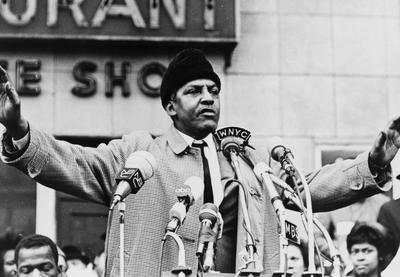Bayard Rustin is perhaps most remembered for the incredible contribution he made during the middle 20th century’s civil rights movement. From the 1930s until his death on August 24, 1987, Rustin lived a life fighting on the front lines of the most critical social and political issues—worker’s rights, Jim Crow, and LGBTQ rights, only to name a few. Throughout his political career, Rustin worked with some of the 20th century’s most prominent figures: Mohandas K. Gandhi (also known as Mahatma Gandhi), Ella Baker, Rosa Parks and Dr. Martin Luther King Jr. However, due to the public record of his homosexuality, Bayard Rustin was forced into the background as an organizer and advisor, and until recently, the forgetful, sometimes unforgiving, shadows of history.
While Rustin’s participation in the civil rights movement enshrined his place in the history of the 20th century, his life and significance have also become relevant during a time when LGBTQ rights are at the forefront of the American conscience. Not only was Bayard Rustin African American during a time when it was acceptable through law and custom to discriminate against African Americans, he was also homosexual at a time when it was possible to diagnose LGBTQ men and women as mentally ill. Rustin did not choose between his race and sexuality because he did not see a reason to choose. He did, however, believe that gay men and lesbians were beginning to show signs of a movement to resist a brand of oppression that was the sibling of the type African Americans had fought in the 20th century. For Rustin, the struggle for LGBTQ rights contained similarities with the civil rights movement.
In 1986, Rustin called gay rights the “central struggle of our time, the central struggle for democracy and the central struggle for human rights.” When Rustin called gays the “new ‘niggers’” he was not making a literal comparison, but rather challenging the hierarchy of suffering and oppression. For Rustin, the facts of oppression and suffering were enough to fight for change. Living his last years during the 1980s AIDS epidemic, Rustin told a group that “Blacks are no longer the litmus paper or barometer of social change.” That title, he concluded, belonged to LGBTQ people. Rustin articulated the similarities between racism and heterosexism by acknowledging that public stereotypes about homosexuals paralleled the justifications for racial prejudice.
Bayard Rustin left a complex, rich legacy that remains relevant. His biographer John D’Emilio appropriately called Rustin a “Lost Prophet.” Rustin was an early HIV/AIDS activist as well. He believed the issue would not be addressed until attitudes about the disease and its victims changed. He also asserted that, akin to African Americans in the civil rights movement, a successful LGBTQ movement required allies willing to stand with their gay and lesbian brothers and sisters. This is what Rustin meant when he stated he would have “been able to do more” for gay rights if he wasn’t gay. Lastly, Rustin did not eschew intergroup tension among an incredibly diverse LGBTQ population. Concerning the prejudice in the gay community, Rustin stated, “I do not believe that they know that it is not prejudice to any one group that is the problem, it is prejudice itself that is the problem.”
In remembering Bayard Rustin, let us recall a human being who was, at his core, a humanist and crusader for love and peace. Brilliant and accomplished, Rustin was also a humble servant to the causes dedicated to his personal convictions. Rustin did not placate or romanticize African Americans or LGBTQ people, but was critical of both groups because he believed one could not simultaneously oppose and perpetuate prejudice and injustice. Let us celebrate Bayard Rustin by remembering his fight for civil and gay rights, but, perhaps even more, by continuing the crusade for global human rights to which he dedicated his entire life.
John Adams is a Ph.D. candidate in African-American and United States History at Rutgers University.
